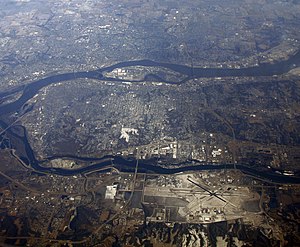Greater Quad Cities, IA–IL is a nickname for the Davenport–Moline, IA–IL Combined Statistical Area,[1] an area that is made up of four counties in Iowa and three in Illinois. The statistical area includes one metropolitan areas and two micropolitan area. As of the 2010 Census, the CSA had a population of 471,551 (though a March 2017 estimate placed the population at 472,153).[2]
Greater Quad Cities CSA | |
|---|---|
 Aerial view of the Quad Cities | |
 | |
| Country | |
| State | |
| Largest city | Davenport, Iowa |
| Other cities | Moline, Illinois Bettendorf, Iowa Rock Island, Illinois East Moline, Illinois |
| Area | |
• Total | 170 sq mi (400 km2) |
| Highest elevation | 850 ft (259 m) |
| Lowest elevation | 590 ft (180 m) |
| Population | |
• Total | 379,374 (147th) |
| • Rank | 147th in the U.S. |
| • Density | 1,600/sq mi (618/km2) |
| Time zone | UTC-06:00 (CST) |
| • Summer (DST) | UTC-05:00 (CDT) |
The area consists of the:
- Quad Cities Metropolitan Area, population 383,681.
- Clinton, IA Micropolitan Statistical Area, population 48,420.
- Muscatine, Iowa micropolitan area, population 54,118.
Counties
editIn Iowa
edit- Scott County pop. 170,385
- Clinton County pop. 48,420
- Muscatine County pop. 42,836
- Louisa County pop. 11,282
In Illinois
edit- Rock Island County pop. 147,258
- Henry County pop. 49,860
- Mercer County pop. 16,178
Communities
editThe communities (both incorporated and unincorporated) in the combined statistical area are as follows:
- In Iowa
- Davenport
- Andover
- Bettendorf
- Blue Grass
- Bryant
- Buffalo
- Calamus
- Camanche
- Charlotte
- Clinton
- Columbus City
- Columbus Junction
- Cotter
- Cranston
- Creekville
- Delmar
- DeWitt
- Dixon
- Donahue
- Eldridge
- Elvira
- Elwood
- Fairport
- Fredonia
- Goose Lake
- Grand Mound
- Grandview
- Le Claire
- Letts
- Long Grove
- Lost Nation
- Low Moor
- Maysville
- McCausland
- Midway Beach
- Montpelier
- Morning Sun
- Moscow
- Mount Joy
- Muscatine
- New Liberty
- Oakville
- Panorama Park
- Park View
- Petersburg
- Princeton
- Riverdale
- Teeds Grove
- Toolesboro
- Toronto
- Walcott
- Wapello
- Welton
- West Liberty
- Wheatland
- Wilton
- In Illinois
Education institutes
editHigher education
editEastern Iowa Community Colleges
Primary and secondary education
editTransportation
editAirports
editBelow is a list of the airports in the greater area, followed by their number of enplanements (commercial passenger boardings) that occurred at the airport in calendar year 2013.
Public
edit- Quad City International Airport (IATA: MLI, ICAO: KMLI, FAA LID: MLI), 49,170
- Davenport Municipal Airport (IATA: DVN, ICAO: KDVN, FAA LID: DVN), 28,251
- Muscatine Municipal Airport (IATA: MUT, ICAO: KMUT, FAA LID: MUT), 14,106
- Clinton Municipal Airport (IATA: CWI, ICAO: KCWI, FAA LID: CWI), 14,106
Transit
edit- Bettendorf Transit
- Clinton Municipal Transit Administration
- Davenport Citibus
- MuscaBus
- Quad Cities MetroLINK
- River Bend Transit
- List of intercity bus stops in Illinois
- List of intercity bus stops in Iowa
Interstates
editPrincipal Highways
editState Highways
edit- Iowa State Route 22
- Iowa State Route 38
- Iowa State Route 70
- Iowa State Route 78
- Iowa State Route 92
- Iowa State Route 130
- Iowa State Route 136
- Illinois State Route 5
- Illinois State Route 17
- Illinois State Route 78
- Illinois State Route 81
- Illinois State Route 82
- Illinois State Route 84
- Illinois State Route 92
- Illinois State Route 93
- Illinois State Route 94
- Illinois State Route 192
Shopping
editBelow are some notable shopping centers in the area:
- NorthPark Mall (Davenport, IA)
- SouthPark Mall (Moline, IL)
- Muscatine Mall (Muscatine, IA)
References
edit- ^ "OMB Bulletin No. 17-01: Revised Delineations of Metropolitan Statistical Areas, Micropolitan Statistical Areas, and Combined Statistical Areas, and Guidance on Uses of the Delineations of These Areas" (PDF). United States Office of Management and Budget. August 15, 2017. Archived from the original (PDF) on January 21, 2019. Retrieved March 6, 2018.
- ^ "Annual Estimates of the Resident Population: April 1, 2010 to July 1, 2017 - United States -- Combined Statistical Area; and for Puerto Rico". United States Census Bureau, Population Division. March 2018. Retrieved March 31, 2018.[permanent dead link]